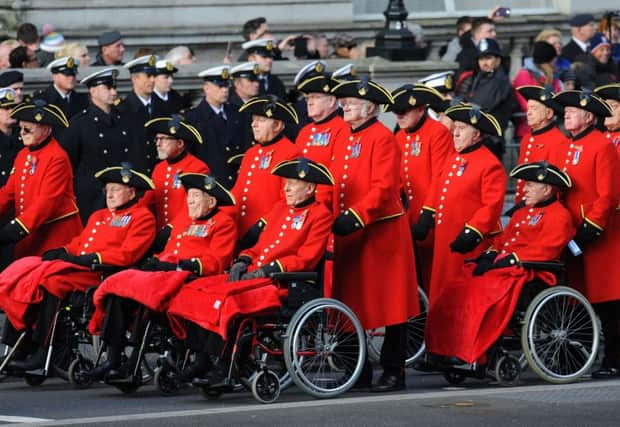YP Comment: Paying tribute to the fallen


From the national commemorations led by the Queen at the Cenotaph to the services held at war memorials across Yorkshire, the nation paused with heads bowed and fell silent for two minutes at 11am to remember the fallen.
This year’s commemorations, both yesterday and on Armistice Day, had particular resonance for Yorkshire. A century ago, at the beginning of the Battle of the Somme, it was our county’s volunteer battalions which went over the top first in one of the bloodiest episodes of the Great War and suffered grievously.
Advertisement
Hide AdAdvertisement
Hide AdTheir sacrifice on that summer’s day in 1916 haunts us still, summing up as it does the horrors of war. But our remembrance should not only be for those who fell long ago.
A key theme of this year’s remembrance commemorations organised by the Royal British Legion has been to remind the country that our Armed Forces continue to make the ultimate sacrifice.
It is a sobering statistic that since the end of the Second World War, 12,000 service personnel have been killed in the line of duty. The losses have continued into our own age, with the fallen of Iraq and Afghanistan.
Nor must we ever forget the survivors of conflict, those men and women with life-changing physical injuries or psychological trauma. They continue to bear the scars of war.
Advertisement
Hide AdAdvertisement
Hide AdAll deserve our gratitude and respect. It is heartening that Britain embraces the remembrance commemorations ever more widely. This year, more poppies than ever before were on sale, 36 million of them, raising vital funds for the care and support of Armed Forces veterans.
Such practical measures are a central part of the commemorations. But so is simply pausing to remember with thankfulness.
Path problems: Footways must be maintained
GETTING people out into the countryside for fresh air and exercise has long been a bedrock of Government policy in tackling Britain’s growing obesity problem.
Yet there is a disconnect between the laudable ambition of encouraging young and old alike into the glorious landscapes of our national parks and failing to provide sufficient funding for the upkeep of the paths through them.
Advertisement
Hide AdAdvertisement
Hide AdThe scale of this problem is set out in today’s Ramblers’ Big Pathwatch survey, which makes for worrying reading. It is a matter of serious concern that getting on for 6,000 paths in Yorkshire have problems, but hardly surprising given that the North York Moors and Yorkshire Dales national parks have suffered budget cuts of 40 per cent over the past five years.
Landowners and volunteers who have stepped in to maintain the rights of way network are due a vote of thanks for their work, but in the long term to expect them to shoulder the burden of responsibility is unfair.
It has been a failing of successive governments to apparently believe that the countryside will look after itself. That is not the case. A realistic level of funding and a great deal of hard work are necessary for the national parks to thrive.
Maintaining access to them through well-maintained pathways is central to the public’s enjoyment of the parks, whether for leisure or the benefit of their health. The Government would do well to study the survey’s findings and consider what it can do to improve matters.
Free to trade: Ports proposal persuasive
Advertisement
Hide AdAdvertisement
Hide AdBRITAIN’S prosperity after leaving the European Union will depend to a degree on innovative thinking, and the proposal to create free ports is one such idea worthy of serious attention.
Ports that are considered outside the country for customs purposes hold out the prospect of creating jobs and boosting trade, according to the Richmond MP Rishi Sunak, and if the country were to go down this route, Yorkshire would be ideally placed to benefit.
The Humber is already one of our principal gateways to international trade, and if the fortunes of its ports could be improved post-Brexit, then that would be of tremendous value not only for our region, but to the wider economy of the North.
Free ports have proved their worth in the United States, and the report makes a persuasive case that they would work for a Britain forging a new economic relationship with the world.